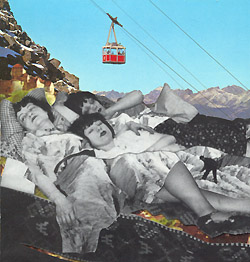CLOAK/3.6iiGreen windows beat impatiently with passing traffic as the slow bus slides the city's wastes of western glassiness across the counters of their eyes, the scene a donut western-glazed and heavy, heavy like anti-matter heavy, heavy like the word thud. |
| Against the skin, just below the breastbone, like cupped hands for catching, cupped hands never spilling, like hearts suspended in a bowl, they still hang their Cloak pouches— already fading the embroidered limbs of those pictographs they'd found explicated on health food packaging. |
| Clothe your large body in blankets with buttons, court superfluity in dress. |
| The cookie dough faces of the figures in Trishna's tabletop installation, Betrayed—how their smiles run down. One day the truth sat down on her; she struggled for breath. |
| Cloak, the fear of placebo—ubiquitous during this phase of testing—its mere rumor the ruin of a dealer's reputation. An interruption of more than two or three days between dosages is enough. |
| Reject Cloak, no return. A single synapse tyrannizes. |
|
The feeling of becoming less creative every twelve hours, a terrifying descent by toboggan, cries cut off, vapor-packed— nearer nearer the excrement ramparts of the countless base camp towns, many abandoned, all uninhabitable— not those squalid streets again, with their familiar reek of mildew and unwash, where expeditions to the peaks are being eternally outfitted, each a little epic of procrastination—where anecdotes reel and plunge like crows at the excuses heaped behind every frustrated ascent— not those late nights in the barter markets poring over maps slit up the fold, while scrawled notes creep round the imprints of wet glasses and every bargain's breaking is assumed. |
Her own brother.    
|
